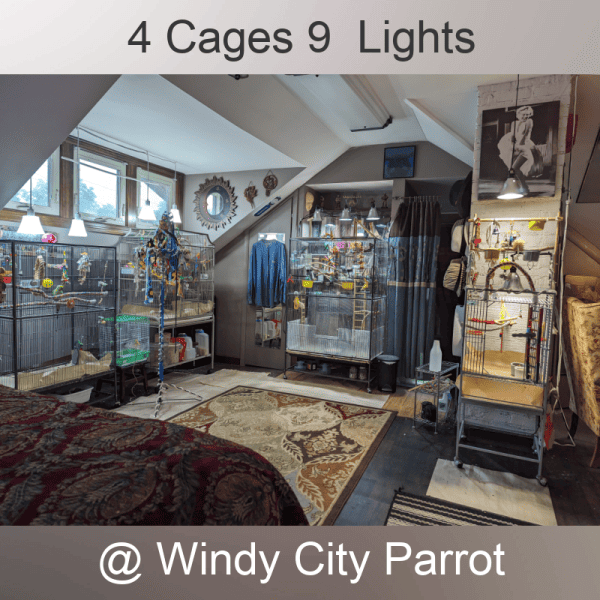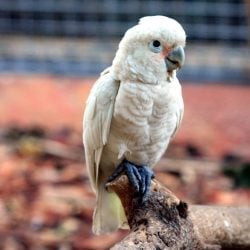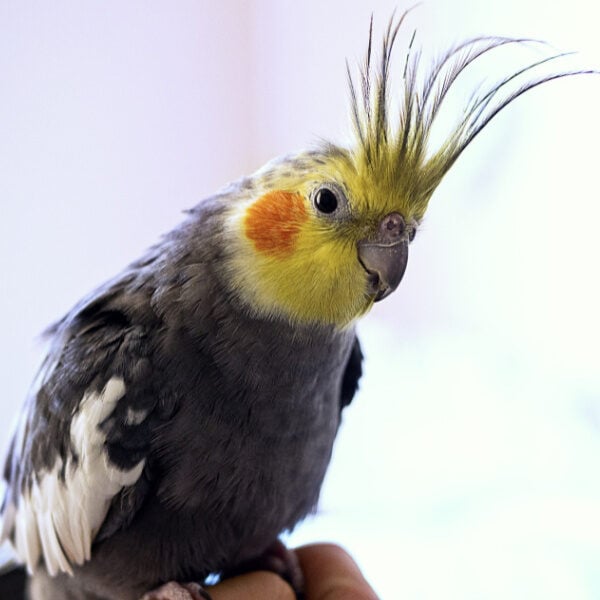Last Updated on by Mitch Rezman
Shelly writes:
Tiki, my 11 yo male Timneh African grey parrot has attacked me 3 times in the past 3 months.
He drew blood from me all 3 times, and each attack has been increasing in viciousness.
I’m getting older and my skin is getting thinner and the attack today left me with 5 cuts on my hands and a broken blood vessel.
He was in my kitchen and I had a friend he is familiar with and likes, over for lunch.
Katherine and I were talking as Tiki was on the bar, when my hand was within reach he attacked me with lightning speed and wouldn’t let go of my hand.
I had to shake him off and he came after me again! The attack before this last one was when I was cleaning poop off his cage and without warning he clamped on to my hand and would not let go.
The 1st attack was again in my kitchen when another male friend who he knows was talking with me, and without warning he bit me and cut my hand but did not clamp on like the last 2 attacks.
Dear Shelly
Sorry to hear that you have a tumultuous relationship with your Timneh.
You say your grey is 11? Have you had him his whole life? Is he clipped?
Have you moved? Any changes in your household?
Does he live in a cage or left out on a stand?
Please, more information so we can better respond.
Catherine
I ignored Tiki and wouldn’t talk to him until this morning, and he was acting like he was fine. I put food in his cage and he didn’t try to bite or act angry when I put my hand in his cage.
I’ve spoken to my local avian vet, Dr. Dunn, and he said that unfortunately he’s had a lot of customers with parrots that suddenly act up. Dr. Dunn said to watch out as parrots can be dangerous with this type of behavior.
Thank you for the additional information.
Yes, this time of year, tropical birds that live in our hemisphere start to deal with rising hormones. It starts in January and ends in March or so. We get calls and emails constantly asking for help.
Females may build a nest and lay eggs which is unhealthy for them as it wastes the calcium in their bodies on the infertile eggs and if they lay over and over it can be bad for their health. Males, don’t suffer from the calcium issue but can become cranky and lash out.
It is best to give them their space and keep your fingers and hands down and away. Use a perch to move them around and avoid letting them near your face during this period.
I ask about the wing clipping as if the bird flies at you, you may need to clip him for your own safety. The clipped feathers will molt out and he will be able to fly again, but he will be grounded some while his mood is poor.
Lighting really does help. How old are your bulbs? If over a year old they may need to be replaced as the quality of light diminishes over time even f they still light up. A light over his play area is also good.
Are your bird lights close to the top of the cage, within 12 inches or so from the bird? If not, lower them. Are they on a timer so they go on every 12 hours, and then off for 12?
You say you have a play top? Is the top tray in place at the top of the cage? if so, take it out and leave it out.
The other pets are good as they are entertainment for him. Greys are smart and need stimulation.
Is he on a schedule? Meaning, does his light go on at the same time daily? His breakfast served at the same time? Treat time? Playtime, Shower time, etc?
Birds can’t tell what day of the week it is but they can tell time without a clock and when they get used to a routine they look forward to it.
Having certain events happen at set times helps the bird relax and not stress over when will she come see me. When will I get a treat? Etc.
Our bird’s bedtime is 7:30 nightly (timer, lights go out) At 7 pm, they all get corraled into their cages and are given a treat. So at 7 pm, they start calling out reminders to us in case we have forgotten.
It is quite charming when after all 4 cages are closed up and they have a special treat (Nutriberries or a bit of spray millet) they are all quiet and happy as they munch and settle in for the night.

There is more involved that Mitch will likely be chiming in on to you about how African Greys choose their mates. So you should hear from him as well.
You are obviously his mate and not just a flock companion. Do you hold him closely, stroke him below the neck? If so, stop that and only pet him from the neck up. Birds do not touch other bird’s bodies below the neck unless they are preparing to mate. But they do lots of head-preening without sexual overtones.
One other thing, birds have a thick layer of feathers. If a bird is jealous of its mate, thinking that someone else is holding its mate’s attention, the bird may lash out or bite at their mate to scold them away from the other, but it doesn’t hurt them with the cover of feathers.
If the bird lashes out at a human, our skin is exposed to the sharp beak and can suffer from it. So keep your skin away during this time. 2-3 months and it should ease up.
Tiki’s bedtime is 7:00 PM and his lights go on and blinds opened at 7:00 AM. At 6:50 PM Tiki starts saying ‘time for beeeed’, so he knows the routine. I don’t lock him in the cage at night, but it might be a good idea to give him a treat and put him to bed in his cage.
Dear Shelly
It sounds like you are doing it all right. Mostly, LOL. That your bird is separated from your home unless you are in your office might cause him to feel left out.
Then when you have company, you bring him out and he lashes out. At you because you are near.
Mitch had a Senegal parrot, Peaches. She LOVED him and hated me as much. (all from the very first day she came to us). If she was on his shoulder and he came near me, she would bite Mitch in the neck.
Basically telling him to stay away from me since she could not reach me. That is likely what happened when your friend Katherine came over.
If Katherine cares for him again, it most likely won’t happen again if you are not around. But sadly it has already resulted in scaring her off. Try to explain this to her. Try to get her to try one time. If your bird does attack her then you can accept her loss as we don’t want our friends to be fearful of our pets.
And yes, time will heal the issue. Best to avoid the possibility of those types of bites as it might be considered acceptable behavior.
But we understand some birds have their quirks. We have a Quaker who is cage and food-protective.
If we stick our hands into the cage and get between him and his food dish, we can expect to get a quick bite. If I am holding his food dishes, I can expect a quick bite, if I am filling his water dishes, I can expect a quick bite. And so on.
I just make sure that I am clear of him and his beak when I tend to these matters.
Once he is away from these triggers, he is fine.
Author Profile

Latest entries
 Bird & Parrot CareJune 20, 2025Understanding the Best Way to Use Prevue Pets Mimic Me Voice Trainer
Bird & Parrot CareJune 20, 2025Understanding the Best Way to Use Prevue Pets Mimic Me Voice Trainer Bird BehaviorJune 6, 2025How Do I Keep My Parrot From Dumping His Food Every Day?
Bird BehaviorJune 6, 2025How Do I Keep My Parrot From Dumping His Food Every Day? Birds & LightingMay 16, 2025I Am Seeking Clarity About Lighting for My Birds Cage
Birds & LightingMay 16, 2025I Am Seeking Clarity About Lighting for My Birds Cage Bird RescueApril 29, 2025How Do We Re-Home a 17 yr Goffin Cockatoo?
Bird RescueApril 29, 2025How Do We Re-Home a 17 yr Goffin Cockatoo?



